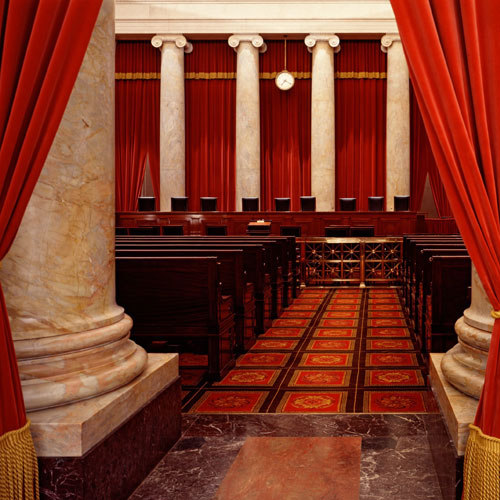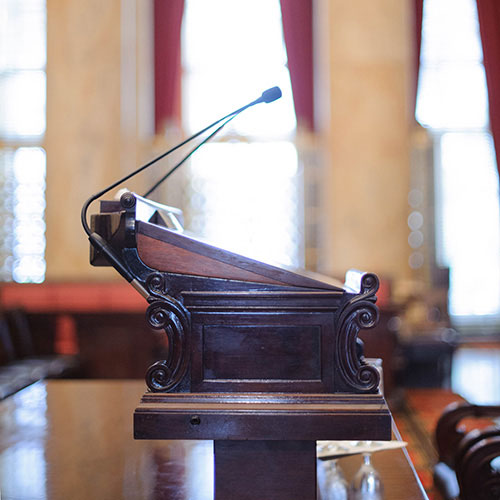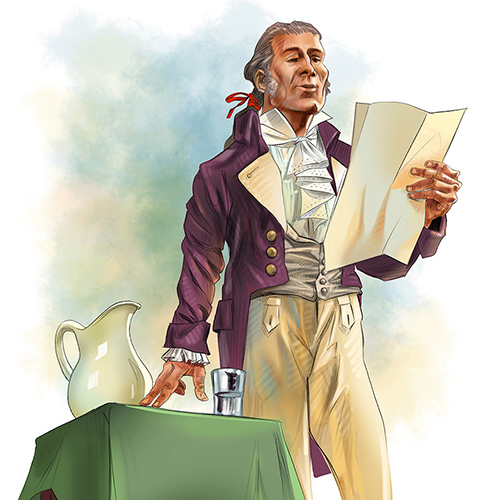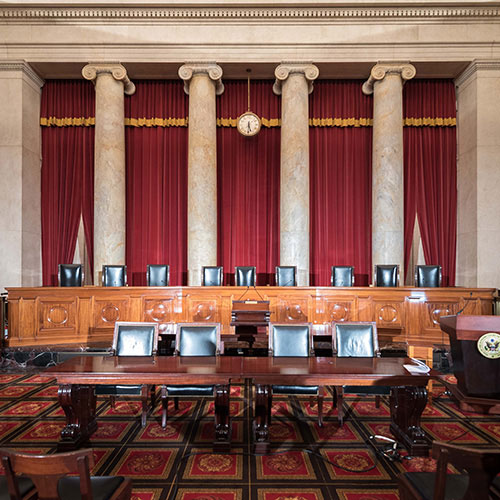By making a tax deductible gift to the Supreme Court Historical Society you will support:
- Curriculum Development for civics education in secondary schools
- The Summer Institute for Secondary School Teacher Training
- The publication of the Award Winning Journal of Supreme Court History and the Supreme Court Historical Society Quarterly
- Multiple Lecture Series and special events
- Acquisition of rare historical documents and texts related to the Supreme Court and the Judicial Branch
- Preservation of the Supreme Court Historical Society’s current library and artifacts collections.
The Supreme Court Historical Society wishes to express our deep gratitude to our many supporters.
We would like to thank the following individuals for their generosity and continued support:
ADVOCATES
Advocates make a contribution of $50,000 or more in support of the Society:
Boies Schiller & Flexner
Joesph Hage Aaronson
King & Spalding
Sidley Austin
The Annenberg Foundation
David Rubenstein
BENEFACTORS
Benefactors make a contribution of $25,000 or more in support of the Society:
American College of Trial Lawyers
BlackRock
Brown & Brown Insurance
Citigroup
Cornerstone Research
Gibson Dunn
Goddard Investment Group
Greenberg Traurig
Jones Day
Latham & Watkins
Paul Hilal
Paul Weiss
Skadden Arps
The Hazen Polsky Foundation
Wilkie Farr & Gallagher
PATRONS
Patrons make a contribution of$12,500 to $25,000 or more in support of the Society:
A&O Shearman
Cohne & Gresser
Covington & Burling
Cravath Swaine & Moore
Delta Airlines
Emory University
Fried Frank Gharris Shriver & Jacobson
Goldman Sachs
Hendrik Meijer
Hogan Lovells
Kramer Levin Naftalis
Mercer University
MoloLamken
Price Philanthropies
Seeger Weiss
Thomson Reuters
Wachtell Lipton Rosen & Latz
Webb Daniel Freelander
UPS Foundation
Additional Ways to Give
Make A Matching Gift Donation
Many corporations and businesses match charitable donations made by an employee with a corporate contribution at no cost to you. To find out if your contribution can work twice as hard to help the Society: Ask if your Personnel or Human Resources office has a matching gift program. If so, ask for a matching gift form and fill out the information. Then mail it to:
Martha Meehan-Cohen
Supreme Court Historical Society
224 East Capitol Street, N.E.
Washington, D.C. 20003
We do the rest!!
Make A Donation of Appreciated Stock
With a gift of appreciated stock you can make an even bigger impact for the Society and for yourself. A gift of appreciated stock allows you to deduct the full fair market value of the stock (as opposed to the price you paid for the stock) – avoiding Capital Gains.
Simply instruct your Financial Professional, Broker, or Banker to direct the gift as follows:
- DTC (routing) number: 0005
- To Account Titled and Numbered: Supreme Court Historical Society, Account Number 030-75559-9
- For Further Information please contact Brett Weiss, CFA (202) 558-6733 or Martha Meehan-Cohen at 202-543-0400.
Should you have any questions you may contact Martha Meehan-Cohen at (202) 543-0400 or mmeehan@supremecourthistory.org
DTC Instructions:
Goldman Sachs & Co. LLC
DTC: 0005
Account Name: The Supreme Court Historical Society
Account #: 030-75559-9
Retirement Accounts
Many people have 401k, 403B, or other tax deferred retirement accounts. At age 701/2, you are required to take an annual minimum distribution from those accounts and at that time, pay taxes of the distribution as it is considered taxable income to you. By making a gift of your required minimum distribution you not only save the tax payment on the income, you are able to deduct the amount of the gift as a charitable contribution on your income taxes. To make a gift of your required minimum distribution, speak with your financial professional or call Martha Meehan-Cohen at the Society at 202-543-0400.
Donor Advised Funds
Donor Advised Funds are set up to make giving easy and tax efficient for the donor. Any individual can set up a Donor Advised fund at many financial institutions. The big benefit of having you own Donor Advised Fund is that you can make a donation to your fund and take the charitable deduction at the time you move the money to your fund. Then – at a later time you can distribute funds to the organization of your choice in any amount that you choose. This relieves the pressure of making donation decisions at tax time and allows you to take the maximum amount allowed by law, each year if you wish, and place it into you fund. It is almost like having your own private foundation, without the paperwork and the hassles!
Real Property
The Society often acquires antiques, artifacts, artwork, writings and books of historic significance to the Court. Gifts of Real Property should be agreed upon prior to the gift being made and must be in accordance with our gift acceptance policies. Please contact us to discuss a gift of Real property.
Legacy Giving
Your bequest helps us insure the Society’s future. Our Development Office will work closely with you and your advisors to design the giving vehicle that is right for your estate plan. Please contact us at 202-543-0400 to discuss the many options and become a part the Legacy Society.
Estate Planning
Techniques by Which to Make Charitable Gifts:
Bequests
A charitable bequest offers the simplest approach. You do not have to rewrite your current documents. You simply add an amendment, called a codicil, to your will or living trust. Your bequest is entirely under your control during life and becomes irrevocable only at death. An individual simply advises their lawyer that he/she would like to make a gift to charity upon his/her death. A gift to charity at death is 100% deductible on the decedent’s estate tax return.
Here is some suggested language:
“I give and bequeath to The Supreme Court Historical Society located in Washington, DC the sum of ____________ dollars ($ _________). (Or state a percentage of your estate, or describe real or personal property, including exact location.) For the benefit of its general purposes (or specify the program you wish to support).”
IRA’s
A designation in your IRA or other retirement plan may be a very cost-effective way of making a gift to the Society. If you leave your retirement plan to an individual, by designating them as the plan’s beneficiary they will have to pay income tax on either a lump sum distribution or the income stream from the plan. The Society does not pay this tax.
Charitable Remainder Trust
A donor establishes this type of trust with assets that have appreciated in value, with the donor as the income beneficiary for his lifetime (or for a term of years) and a charity as the remainder beneficiary (thus the name remainder trust). The donor receives an annual percentage payout from the trust, and a tax deduction when he establishes the trust. The older the donor and the lower the percentage payout, the higher the charitable deduction; the younger the donor and the higher the percentage payout, the lower the deduction. This trust allows an individual to sell a single asset income tax deferred inside the trust and to invest the proceeds inside the trust in a diversified manner. The donor pays income tax on the distributions he receives from the trust. On the donor’s death, the assets in the trust are distributed to the charity named by the donor in the trust.
Charitable Lead Trust
This type of trust provides for a distribution to charity for a term of years, after which time the assets in the trust are generally distributed to the donor’s children or grandchildren as the remainder beneficiaries. The purpose of this type of trust is to make a gift to one’s family at a discounted value, while at the same time benefiting charity.
Life Insurance
As with an IRA, the Society may be listed as the beneficiary of a life insurance policy. The Society may be listed as a primary beneficiary or a secondary beneficiary.
Further Information
The Supreme Court Historical Society is recognized by the Internal Revenue Service as a 501 (c) (3) not for profit educational organization. Contributions to the Society are tax-deductible to the extent allowed by law. For more information about ways to support the Society’s work, please call (202) 543-0400 or send an e-mail to our Director of Development, Martha Meehan-Cohen. For additional information about the Society, please visit Guidestar.org
The Supreme Court Historical Society is always eager to hear what you think. Please share your ideas and suggestions at:
suggestions@supremecourthistory.org
Your comments will be sent to a member of the Society’s staff. Thank you for your interest in helping the Society improve its services and program offerings.





